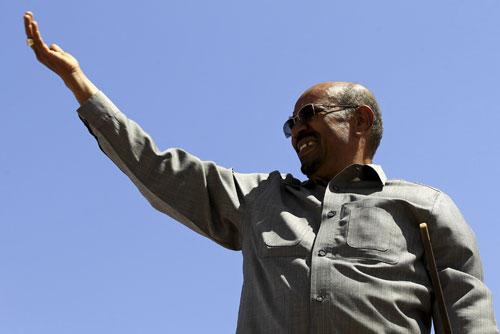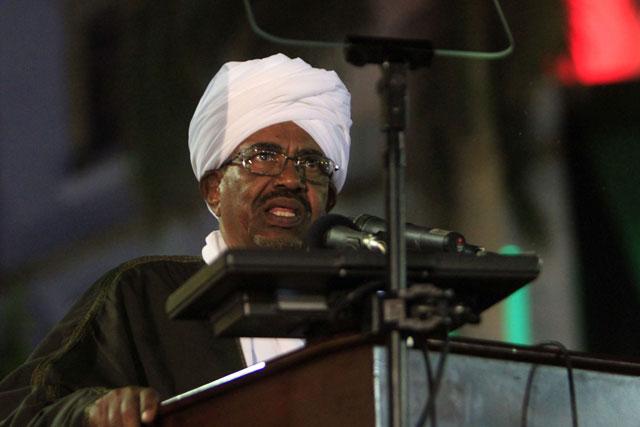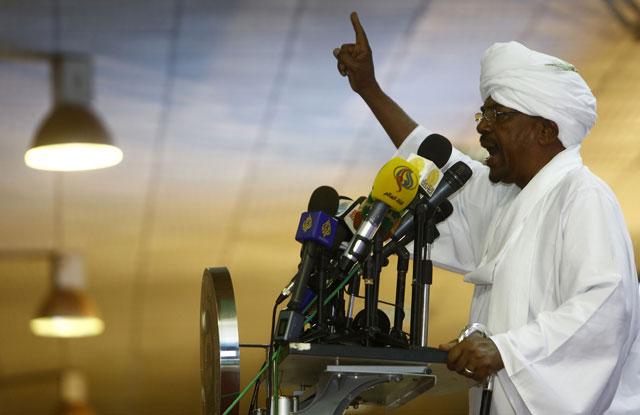You are here
Sudan vote set to extend Bashir rule as opposition boycotts
By AFP - Apr 09,2015 - Last updated at Apr 09,2015

KHARTOUM — Sudan heads to the polls next week in elections widely expected to extend President Omar Bashir's quarter-century rule, despite his indictment for alleged war crimes, continued unrest and a faltering economy.
Bashir is facing 15 little-known challengers in the vote — which takes place over three days starting Monday — but main opposition parties are boycotting.
Rights groups have accused the 71-year-old Bashir, twice indicted by the International Criminal Court (ICC), of crushing dissent with a crackdown on the media and civil society.
The EU also raised concerns, saying the elections cannot produce a "credible" vote.
Khartoum released two top political detainees on Thursday, their lawyer saying it was a move to ease international pressure.
In the capital, there are few signs presidential and parliamentary elections are days away, despite official figures showing the participation of 44 parties.
Bashir's face looms from billboards lining main streets, but only a few flyers for other candidates are up around the city.
"The election is being boycotted by most opposition parties, the [ruling] National Congress Party is the only real contender for this election. So you can't really expect any surprises," said Khaled Al Tijani, an analyst and newspaper editor.
Career soldier Bashir took power in an Islamist-backed takeover in 1989, the last in a series of coups that marked Sudan after its independence from joint British and Egyptian rule in 1956.
He has since overseen the country's split with South Sudan after a 22-year civil war, but faces continued unrest on several fronts.
A rebellion in the western Darfur region erupted in 2003, where ethnic insurgents complained of marginalisation, that has left some 300,000 dead.
Bashir is wanted by the ICC for alleged war crimes in Darfur.
Insurgencies have also broken out in the South Kordofan and Blue Nile regions, led by former allies of south Sudanese rebel forces, and the Sudan People's Liberation Army-North has vowed to stop voting across the regions.
Officials have insisted the rebels will not disrupt the vote, but the election will not take place in one district of Darfur and seven in South Kordofan for security reasons.
Despite the threats, Bashir has promised on the campaign trail that his next term will bring nationwide stability.
He has made few concrete policy promises but has vowed to boost development of Sudan's economy, which for years has suffered from international isolation.
The United States imposed a trade embargo in 1997 over alleged rights abuses and sanctions over Khartoum's sheltering of Al Qaeda leader Osama Ben Laden in the early 1990s.
More than three quarters of the country's oil reserves were also lost with South Sudan's split.
With only a few weeks to go before the vote, Sudan last month agreed to join the Saudi-led coalition against Shiite rebels in Yemen, a move Tijani said may be aimed at giving the economy a boost.
"The coalition in the war in Yemen could ease the economic situation in Sudan, which may be expecting to get some assistance from Saudi Arabia," he said.
After years of divisions, opposition groups formed a movement dubbed Sudan Call aimed at presenting a united face against Bashir.
Led by the main opposition Umma Party, Sudan Call agreed to talks with the ruling NCP in Addis Ababa in late March to arrange a national dialogue.
But the NCP snubbed the meeting and said the dialogue would take place after the elections.
"When dialogue is bypassed, some groups are excluded and civil and political rights are infringed, the upcoming elections cannot produce a credible result," EU foreign affairs head Federica Mogherini said in a statement.
And on Thursday, Khartoum freed top opposition leaders Farouk Abu Issa and Amin Makki Madani, who were arrested in December after signing Sudan Call and had faced calls from a prosecutor to charge them on six counts.
Their lawyer Mohammed Al Zein said their release had come because the "president doesn't want international pressure" ahead of the vote.
Security forces have also targeted media and civil society groups, with agents in February seizing the print runs of 14 dailies in one day.
The opposition says it has been left with no choice but to refuse to take part.
"We think the only way out is to boycott the elections," said Mariam Al Mahdi, the Umma Party's deputy head.
"We are following civil resistance and civil paths to challenge the regime."
The presidential election could theoretically go to a second round if no candidate wins a first round majority. Officials have said final results will be released in late April.
Related Articles
Sudan's President Omar Al Bashir launched his bid for reelection Sunday, facing little threat to his quarter century in power despite an ailing economy, multiple insurgencies and allegations of war crimes.
Sudan was voting Monday in elections boycotted by the mainstream opposition that are expected to extend the quarter-century rule of President Omar Al Bashir, who is wanted on war crimes charges.
Sudan's President Omar Al Bashir was elected to another five years in office, results showed Monday, despite international war crimes charges and a vote marred by low turnout and an opposition boycott.


















